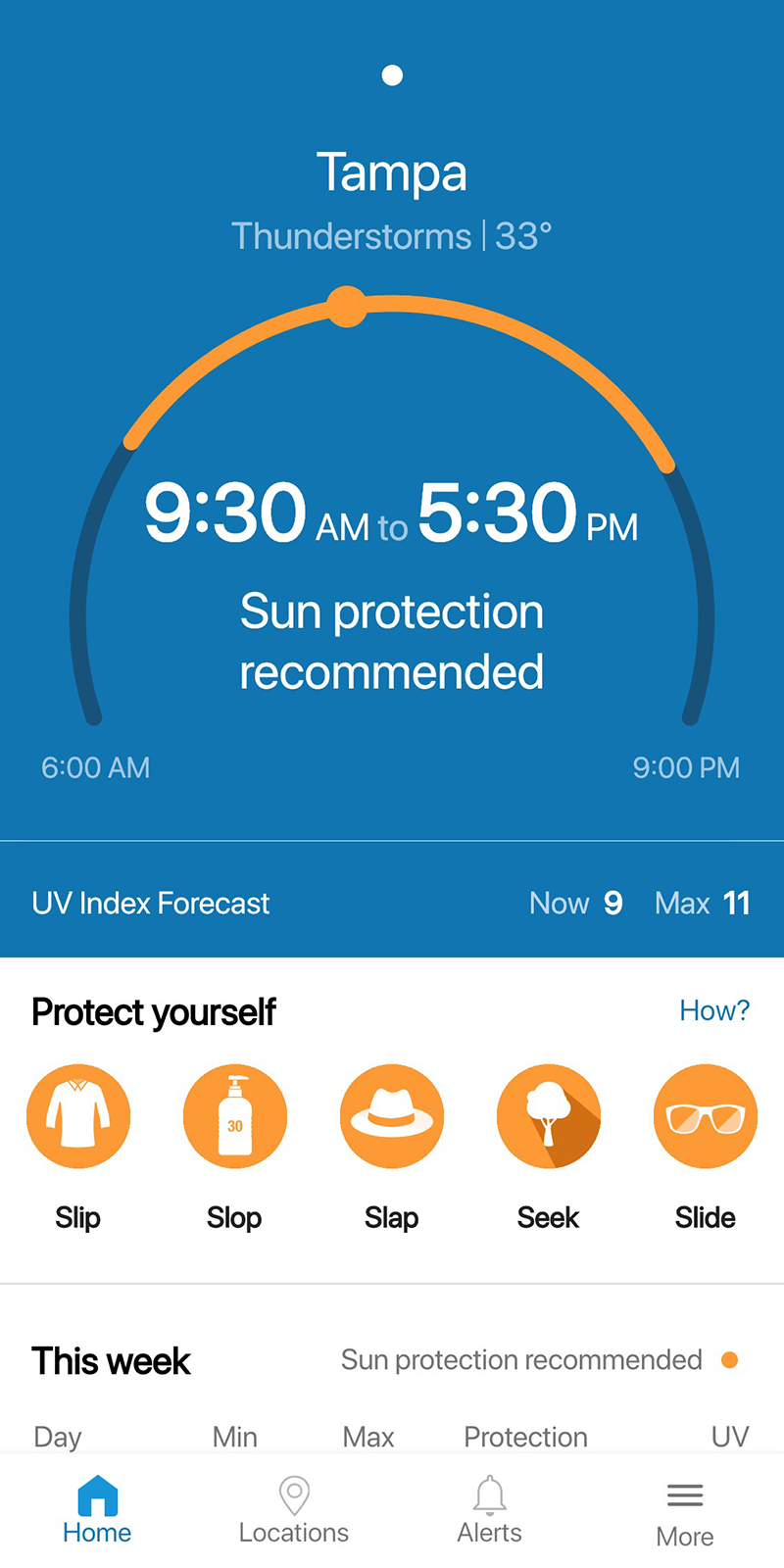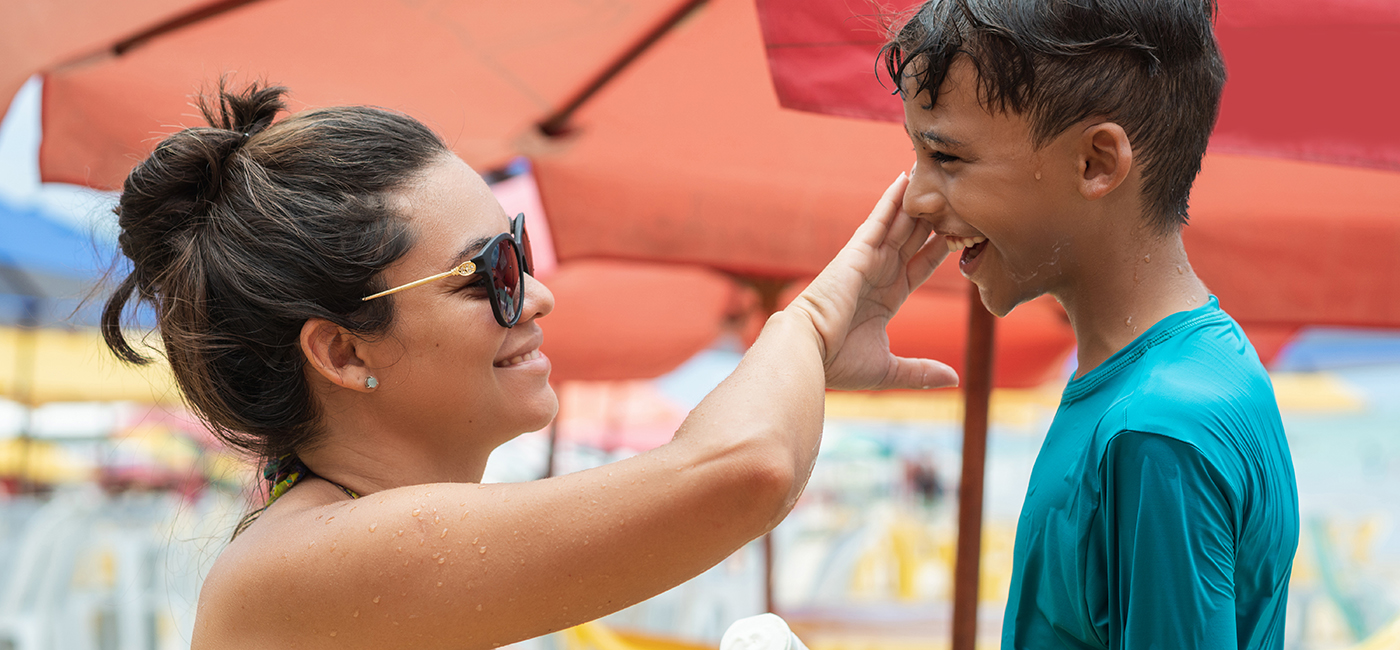Concerned About UV Exposure? There are Apps for That!
Avoiding or minimizing the amount of time we spend in sunlight and exposure to ultraviolet (UV) radiation significantly reduces our chances of developing skin cancer. But during the summer months, especially in Florida, avoiding that exposure is nearly impossible.

The SunSmart Global UV app provides five-day UV and weather forecasts at searchable locations and highlights times when sun protection is most important.
Fortunately, there are a number of ways to protect ourselves, and the World Health Organization (WHO) has added some technology to that mix. Recently, the WHO launched a new mobile app that provides localized information on UV radiation levels. The SunSmart Global UV app provides five-day UV and weather forecasts at searchable locations and even highlights time slots when sun protection is most important.
It is just one of several such apps available to download for free in the Apple Store and in Google Play.
One of the easiest ways to stay protected is to limit sun exposure between 10 a.m. and 4 p.m., when UV light is its most intense, according to Dr. Vernon Sondak, chair of Moffitt Cancer Center’s Department of Cutaneous Oncology. The effects of exposure to UV radiation — whether from the sun or indoor tanning beds — are cumulative, meaning they add up over your lifetime. That means the best way to protect yourself is to limit your exposure.
“Every summer we look forward to going out to the beach and basking in the sunshine, but the sun is not always our friend,” Sondak said. “Protect yourself from the sun’s harmful ultraviolet rays, and get your skin checked at least yearly.”
Skin cancer is the most diagnosed cancer in the United States and is among the most preventable cancers. According to the American Cancer Society, an estimated 3.4 million Americans will be diagnosed with skin cancer in 2022.
If you notice any unusual changes in your skin, such as a lesion that itches, bleeds or scabs, it’s important to have it checked out, no matter how subtle it seems to be.
“Skin cancers, including melanoma, are right there on the surface and that means we have the opportunity to find them early when treatment is least invasive and potentially most effective,” Sondak said. “We must remain diligent in protecting ourselves, especially in the summer months.”

Moffitt returns to Pier 60 in Clearwater on Saturday, July 30, from 9 a.m.-3 p.m. to offer free skin cancer screenings. The annual event will also include free screenings for head and neck cancers throughout the day.
To help protect yourself and your family, the skin cancer experts at Moffitt offer the following tips:
- Sunscreen – Before going outside, always apply a waterproof, broad-spectrum sunscreen with a sun protection factor (SPF) of 15 to 30. Pay particular attention to easily missed areas of your body, such as your ears, the tops of your feet and the part in your hair. Also, remember that sunscreen wears off, so you’ll need to reapply every two hours, as well as after you swim or sweat.
- Clothing – The best way to protect your skin from sun damage is to cover it with clothing, including a loose-fitting, long-sleeved shirt and long pants made of a tightly woven fabric. Of course, wearing this type of clothing will be impractical if you’re swimming, so be sure to keep a T-shirt or rash guard on hand to cover up with while you’re in the water.
- Hat – Protect your head, ears, face and neck with the shade of a wide-brimmed hat constructed of a tightly woven fabric like canvas (UV rays can penetrate a straw hat). If you wear a baseball cap, be doubly sure to protect your ears and neck with sunscreen.
- Sunglasses – Protect your eyes by wearing wraparound sunglasses that block both UVA and UVB rays (most sunglasses sold in the U.S. meet this requirement, regardless of their cost). Well-designed sunglasses can help shield your eyes from damaging UV rays, prevent cataracts and also protect the delicate skin around your eyes from the harmful effects of sun exposure.
- Shade – Seek shade underneath a shelter, umbrella or tree, especially during the midday hours. Even if you are in a shaded area, you should still protect yourself with sunscreen, clothing, a hat and sunglasses.
- Water – Be sure to stay well-hydrated by drinking plenty of water throughout the day. While this is always important, it is critical when you are spending time in the sun.
The UV index tells you when the ☀ is most dangerous. When it indicates 3 and above, you need sun protection.
— World Health Organization (WHO) Western Pacific (@WHOWPRO) June 28, 2022
Download the SunSmart Global UV app to protect yourself from overexposure to #UVradiation & lower your risk of skin cancer! https://t.co/wADmV2J02H pic.twitter.com/dliNJwuutT



